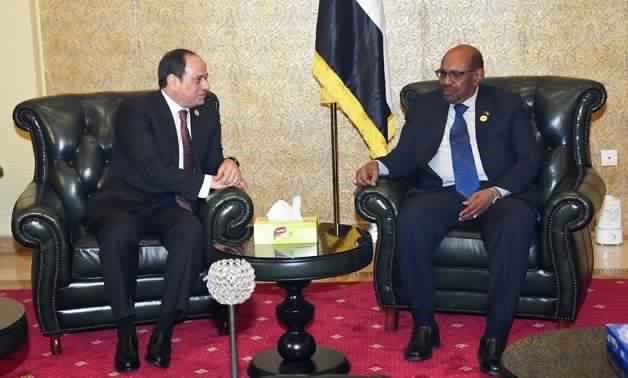
FILE - Egyptian President Abdel Fatah al-Sisi (L) meets with Sudanese counterpart Omar al-Bashir (R) in Addis Ababa on January 27, 2018- press photo
CAIRO – 19 March 2018: The two Nile River neighbors, Egypt and Sudan, have common bonds of history, language and religion. But, diplomatic relations have been frosty over the past years due to various reasons. Sudanese President Omar al-Bashir will visit Cairo on Monday amid frequent attempts to solve a number of controversial issues between the neighboring countries.
Political analyst Mohamed Latif told Egypt Today that the Sudanese president's visit to Egypt will specify the situation of bilateral relations in the next period.
He added that the Egyptian Acting Director of General Intelligence Service (GIS) Abbas Kamel said that the visit to Khartoum was fruitful and showed that exchanging visits can contribute to limiting conflict and reaching a middle ground between the two sides.
Latif pointed out he had information that there was an Egyptian-Sudanese agreement to lower the intensity of disputes in the coming period, including supporting the Egyptian position in the Grand Ethiopian Renaissance Dam issue, boosting cooperation in many fields and increasing Egyptian investments in Sudan.
Latif noted that this visit came upon an invitation delivered by Kamel to al-Bashir so that they can discuss many important issues, notably relating to Halaib and Shalatin, in order to avoid a continued deterioration in relations.
He said that such visits contributed to the return of the Sudanese ambassador to Egypt, which reflects that bilateral relations are on the right track.
Parliamentarian Hatem Bashat said the Sudanese president's visit to Egypt at this time showed both countries' keenness to solve their disputes.
On February 8, Egypt hosted the quartet meeting to discuss recent challenges to the bilateral relationship, according to a statement released on Sunday by Egyptian Foreign Ministry spokesperson Ahmed Abu Zeid.
Egyptian relations with Sudan were recently strained over the border area of Halaib and Shalatin. On December 23, 2017, Sudan filed a complaint to the United Nations Secretariat to protest a maritime border demarcation deal between Egypt and Saudi Arabia, as the deal denotes the territory as Egyptian on maps.
Halaib and Shalateen, or the Halaib Triangle, is an area of land measuring 20,580 square kilometers, located at the Egyptian-Sudanese border on the Red Sea coast. It is part of the Red Sea governorate and consists of three major towns – Halaib (which became a city in February 2014), Abu Ramad and Shalateen.
The area belongs to Egypt politically and administratively, but has been one of the major sticking points in Egyptian-Sudanese relations since the demarcation of borders between the two countries were carried out during the British occupation of Egypt in 1899, at a time when Sudan was part of the Egyptian Kingdom.
The issue re-emerged after Halaib and Shalateen declared electoral constituency in both Sudan and Egypt in 2014.
Egypt affirmed that it has never concluded any international treaties or agreements, whether with the U.K. or Sudan, to give international status to the demarcation of administrative borders.
The largest tribes that inhabit Hala'ib Trinagle, including Rashaida, Alababdeh and Bashaira, rejected the Sudanese National Election Commission's decision that granted the people in Hala'ib the right to participate in Sudanese general elections. The three tribes asserted during the 6 October War victory celebration in 2009, that the area is 100 percent Egyptian.


Comments
Leave a Comment